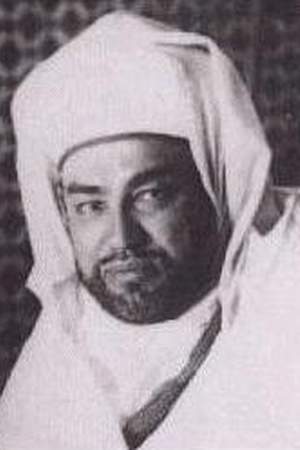Yusef of Morocco Biography
Moulay Yusef ben H*an (Arabic: مولاي يوسف بن الحسن), born in Meknes on 1882 and died in Fes in 1927, was the 'Alawi sultan of Morocco from 1912 to 1927. He was the son of H*an I of Morocco, who was the son of Muhammad IV of Morocco.
Life
Main article: 'Alawi dynastyYusef in 1920Silver coin: 5 Dirhams Yusuf - 1918Moulay Yusef was born in the city of Meknes to Sultan H*an I. His mother is Lalla Um al-Khair, a Moroccan lady whose last name is not recorded. He has a twin brother, Moulay Mohammed al-Tahar. He inherited the throne from Sultan Abd al-Hafid, who abdicated after the Treaty of Fez (1912), which made Morocco a French protectorate.
Moulay Yusef's reign was turbulent and marked with frequent uprisings against Spain and France, of which two were serious: the Rif War and the Sahrawi rebellion. The Rif War was a Berber uprising led by Abd el-Krim in the Rif in the Spanish colony in the north; el-Krim managed to establish the Republic of the Rif. The second was an uprising of the Hasani-Sanhaja Sahrawis in the French colony in the south, which was led by Ahmed al-Hiba, the son of Ma al-'Aynayn.
The Rif War eventually reached the French colonial region, prompting the creation of a Franco-Spanish military coalition that finally defeated the rebels in 1925. To ensure his own safety, Yusef moved the court from Fez to Rabat, which has served as the capital of the country ever since.
Yusef's reign came to an abrupt end when he died suddenly of uremia in 1927. He was succeeded by his son, Mohammed V, and was buried in the royal necropolis of the Moulay Abdallah Mosque.
Private life
Moulay Youssef married three times and had at least eight children. The fact that he had a harem is not explicitly stated, it is only indicated that he had a slave concubine whom he ended up marrying. Here are the descent he had with his wives:
Lalla Yacout, whose last name is not recorded, was his first wife. Their marriage took place around 1907, she died on September 1, 1953, and was buried in Fez. Among their children are:
- Moulay Idriss (1908–1962), he was removed from the order of succession because he suffered from an autoimmune disease;
- Sultan Sidi Mohammed (1909–1961), better known as King Mohammed V;
- Lalla Amina, she was nicknamed la parisienne, for her fondness of this city, she often travelled there.
- Moulay Abdeslam, born in 1914.
Lalla Ruqaya bint Mohammed al-Moqri, he married her around 1915. They had no children together. Before this marriage she was the wife of Sultan Moulay Abdelhafid, but divorced from the latter;
A woman whose iden*y is unknown who is either his slave concubine or one of his wives. She is probably the mother of two of Moulay Youssef's distinctly mixed-race children:
- Mohammed al H*an, (1909–1969)
- Lalla Zainab
The iden*y of the mother of two of Sultan Moulay Youssef's daughters is not mentioned. These daughters are:
- Lalla Zubaida;
- Lalla Khadija, she married a man from the Boufarès family, their son was Moulay Mamoun Boufarès. The latter married Latifa Benzaouia together they had Princess Lalla Oum Kelthoum, wife of Prince Moulay Rachid.
Aïsha, a slave concubine of unknown origins whom Moulay Youssef ends up marrying. Around 1924, she was offered to the sultan by the Pasha of Marrakesh Thami El Glaoui. Described as very beautiful, she became Lalla Aïsha after entering the harem. Yacout S*on was charged by the sultan with personally taking care of her clothing. Aïsha became very close to her seamstress who spoiled her and prepared the best dishes of Jewish cuisine. She was pampered and chose the fabrics for her ceremonial clothes before anyone else. Her first pregnancy, which was also her last, ended in tragedy when at seven months her fetus perished and childbirth had to be induced a month later, the child stillborn. The sultan moved by her hardship married her, putting an end to her status of concubine and granted her the *le of Oum Sidi Aïsha, a *le reserved for the mother of the heir to the throne. They had no children together.
Honours
- Grand Cross of the Order of the Crown (Kingdom of Belgium)
- Grand Cordon of the Order of Muhammad Ali (Kingdom of Egypt)
- Grand Cross of the Legion of Honour (France, 1912)
- Grand Cross of the Order of Saints Maurice and Lazarus (Kingdom of Italy)
- Grand Cross of the Order of Isabella the Catholic (Kingdom of Spain)
- Order of Blood (Tunisia)
- Honorary Grand Cross of the Order of St Michael and St George (GCMG) (United Kingdom, 12 November 1917)
See also
- List of Kings of Morocco
- History of Morocco
References
External links
- Morocco Alaoui dynasty
- History of Morocco
- Treaty of Tangier (1844)
- Treaty of Wad Ras (1860)
- Treaty of Fes (1894)
- Algeciras Conference (1906)
- Pact of Cartagena (1907)
- Morocco–Congo Treaty (1911)
- Treaty of Fes (1912)
- Franco-Spanish Treaty (1912)
- Tangier Crisis (1905–06)
- Agadir Crisis (1911)
